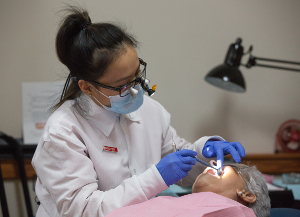Why hospice patients need—and deserve—better oral health care
Creighton University Graduate School
 Photo Credit: Dave Weaver/Creighton University Photo Credit: Dave Weaver/Creighton UniversityHospice care is intended to keep terminally ill patients comfortable in their final days. Yet, says one dentist who has long worked in that environment, proper oral care and dentistry is often overlooked or even ignored in many hospice units.
“It has been evident to me that there is little time for oral care within the typically very busy day of already extended nursing home staff,” said Kristi Soileau, DDS, who has practiced nursing home dentistry for 30 years.
As Soileau was planning for her practicum and capstone experiences through Creighton’s Master of Science in Health Care Ethics program, she decided to center her experiences on oral care for hospice patients, with a focus on comfort, compassion and dignity.
In her recently published article, “The Hospice Patient’s Right to Oral Care: Making Time for the Mouth,” Soileau explains how hospice patients need—and deserve—proper oral care.
“I wanted to ignite a spark of awareness about the need for oral care throughout one’s life, and not simply based on cosmetic awareness or acute pain management,” she said. “It is vital for both emotional as well as physical support and improved quality of life.”
From a physical health standpoint, Soileau says proper oral care can lead to more benefits than comfort alone.
“In the past 20-plus years, medical literature is replete with information substantiating the systemic connection to oral health,” said Soileau. “Dental and other oral diseases promulgate higher risk for stroke, cancer, viral pneumonia, brain abscesses, poorer diabetic control, and the like.”
Despite the benefits, caregivers face many barriers that keep them from providing proper oral health care, she said, including:
- Lack of staff time
- Inadequate supplies
- Nonexistent dental insurance
- Not having a dentist on staff
- Poor patient cooperation
- Insufficient knowledge in dealing with the needs of the aged
Worst of all, she said, some see oral care for hospice patients as futile—a mindset that Soileau takes to task.
“Health care professionals are called to respond empathically to treat the whole person, preserving patients’ humanity, while working through challenges,” Soileau says.
Proper oral care can also help maintain a patient’s quality of life and dignity in their final days. Soileau ays that dentists should:
- Advocate for caregivers, hospice unit staff members, and families to learn to administer oral health care.
- Educate students about the need to perform charitable services where need is significant.
- Set standards for hospice patient oral care and train caregivers to meet those standards.
 Photo Credit: Elizabeth Dondis Photo Credit: Elizabeth Dondis
“Hospices only require a caregiver to offer the best therapy possible given the limitations that may exist,” she said. “Comfort care is not so linked to rules and regulations, but rather to general compassion and well-intended alleviation of distress.”
Soileau believes proper oral care for hospice patients is crucial in easing that distress.
Kristi Soileau, DDS, is a graduate of Creighton University's Master of Health Care Ethics program. Discover how this master's program can train you to navigate complex issues facing the health care industry.
Creighton University offers a top-ranked education in the Jesuit, Catholic tradition. Read more about the university, and connect with Creighton on Facebook, Twitter and Instagram.
|
 Photo Credit: Dave Weaver/Creighton University
Photo Credit: Dave Weaver/Creighton University Photo Credit: Elizabeth Dondis
Photo Credit: Elizabeth Dondis